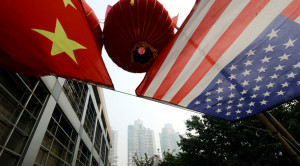
When Crimea voted to join the Russian Federation, the Chinese were particularly cautious in how they responded diplomatically. China even abstained from voting on a resolution submitted to the UN General Assembly backing Ukraine’s territorial integrity.
Their somewhat ambiguous statements and moves have given license to international press houses to portray China as opposing Russia. Headlines such as the Business Insider’s “China Doesn’t Back Russia’s Invasion Of Crimea — And That’s A Big Problem For Putin,” seem to describe Beijing as wholly abandoning Moscow over the ongoing Ukraine crisis.
The Business Insider even goes as far as saying, “Russia’s Vladimir Putin has committed a grave strategic blunder by tearing up the international rule book without a green light from China. Any hope of recruiting Beijing as an ally to blunt Western sanctions looks doomed, and with it the Kremlin’s chances of a painless victory, or any worthwhile victory at all.”
Another assessment, this time from Bloomberg’s Businessweek, strikes a little closer to reality. In an article titled, “Is China Siding With Putin in the Ukraine Crisis?,” Businessweek states, “The Chinese might naturally sympathize with Vladimir Putin, someone willing to stick it to Western leaders such as President Obama. However, China has long opposed actions that smack of interference in other countries’ internal affairs, in part to keep outsiders away from such sensitive issues as Tibet and Chinese dissidents.”
In reality, Beijing has departed with Moscow in rhetorical terms only, and even still, only tentatively so. In reality, Beijing and Moscow are still working closely together with common strategic interests in mind, and China most certainly is backing Russia in regards to Ukraine, however subtly. Editorial angles like those at the Business Insider, as well as Foreign Policy Magazine, and TIME, are attempts to stir up division if possible among the ranks of analysts and editorial boards prone to taking up sensational narratives. This then helps build public consensus, however has little to no effect on the diplomatic ties between Russia and China, or each nation’s respective foreign policies.
While China persistently maintains its non-interference stance in all matters foreign policy, and many have tried to compare Russia’s involvement in Crimea as comparable to Tibet being peeled away from China, in reality what Russia has done is more closely an analogue of what China would like to see become of Taiwan and other disputed regions it has historical, cultural, linguistic, financial, and geopolitical strategic ties to.
In fact, what has created the Ukrainian crisis in the first place, namely US and European Union backing of opposition groups to overturn not only Ukraine’s political order, but Ukraine’s long standing relationship with Moscow, resembles precisely what the United States has been and continues to try to do in Chinese territory, particularly in Tibet and the western province of Xinjiang. By supporting Russia on Ukraine, China will be able to ensure it too can reserve the right to protect itself along its own borders from foreign-backed upheaval.
The prospect of large scale unrest in China’s border provinces and the installation of a foreign backed government attempting to breakaway from Beijing would necessitate China to make moves very similar to what Russia has done in Crimea. In many ways, China is already struggling along this path to maintain its territorial integrity, albeit on a smaller scale, attempting to check foreign funded independence movements by reasserting Beijing’s authority through a combination of soft power backed by security operations when necessary.
Despite the sensational headlines, the thinking in Beijing most certainly gravitates toward backing Russia on the Ukraine issue. Its perceived ambiguous diplomatic stance on the matter affords it more room to maneuver, not just in regards to its subtle support for Russia, but in all matters regarding both foreign and domestic policy.
By taking too strong a stance now, Beijing might tie its hands in the future when it is their turn to guard their territory and their various spheres of influence. This too might be what was intended by the West’s intentional twisting of Beijing’s statements, to garner from China’s leadership a more committal statement that can be used against it in the near future.
As one of China’s greatest strengths, opacity in all it does has left its competitors in the West confounded, and wisely, Beijing has denied the West this latest potential leverage by not taking a firmer stance on Crimea. Determining what China’s leadership is thinking when they look at Crimea, either “Taiwan” or “Tibet,” is difficult at best and leaves China with the ability to pursue its agenda regarding both without any rhetorical commitments regarding the Ukraine crisis or its support for Russia to tie it down
Ulson Gunnar is a New York-based geopolitical analyst and writer especially for the online magazine “New Eastern Outlook”
